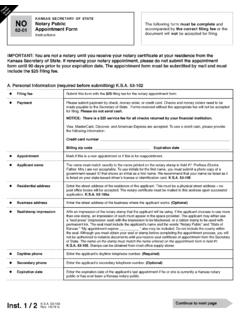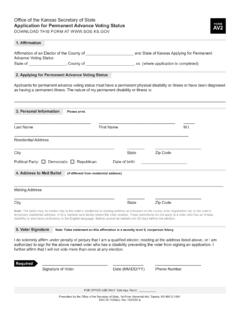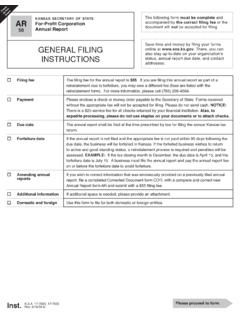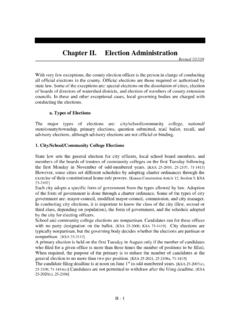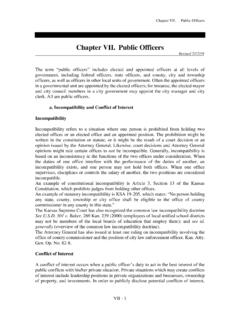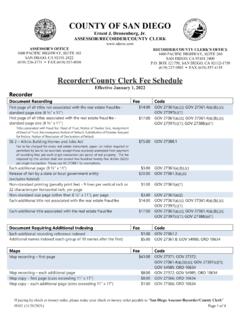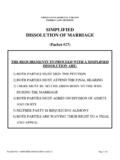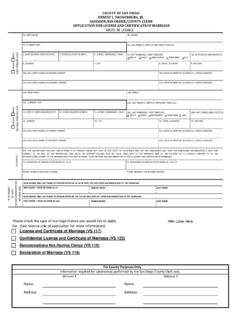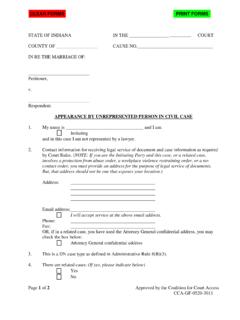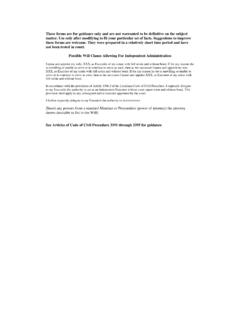Transcription of KANSAS NOTARY HANDBOOK - Kansas Secretary of State
1 KANSASNOTARY HANDBOOKP repared by the Office of Secretary of State Scott SchwabUpdated January 1, 2022 KANSAS NOTARY HANDBOOK Table of Contents Page Purpose of a NOTARY Public .. 3 Jurisdiction of a KANSAS NOTARY .. 3 What is a Notarial Act? .. 4 Types of Notarial Acts .. 4 Acknowledgment .. 4 Acknowledgment in a Representative Capacity .. 4 Witnessing or Attesting a Signature .. 5 Certifying or Attesting a Copy of a Record .. 5 Prohibition on Photocopying Certain Documents .. 5 Administering an Oath or Affirmation .. 6 Taking a Verification on Oath or Affirmation .. 6 Notarizing Wills .. 7 How to Notarize a Tangible (Paper) Document .. 7 Physical Presence Requirement .. 8 Verification of Identity .. 8 Refusal to Perform a Notarial Act .. 8 Notarial Certificate .. 9 Completing a Notarial Certificate .. 9 Fee for a Notarial Act.
2 10 Notarizing for an Individual Who is Unable to Sign .. 10 How to Become a KANSAS NOTARY .. 10 NOTARY Stamp .. 11 NOTARY Stamp for a Tangible (Paper) Document .. 11 NOTARY Stamp for an Electronic Document .. 11 Lost or Stolen Stamp .. 11 NOTARY Journal .. 12 Journal Entry .. 12 Retention of a NOTARY Journal .. 12 Surety Bond .. 13 Denial, Refusal to Renew, Revocation, or Suspension of a NOTARY Commission .. 13 Change to a NOTARY Commission .. 14 Renewal of a NOTARY Commission .. 15 Resignation of a NOTARY Commission .. 15 Name Change .. 15 NOTARY Commission Follows the NOTARY .. 15 Financial or Beneficial Interest .. 15 Advertising NOTARY Services .. 16 2 Prohibited Acts and Penalties .. 16 Failure to Attach NOTARY s Commission Expiration Date .. 17 In-Person Electronic Notarizations (IPEN) .. 17 Remote Online Notarizations (RON) .. 18 NOTARY Training and Testing Required for IPEN and RON.
3 21 Apostilles and Authentications .. 21 Short Form Notarial Certificates .. 22 Glossary .. 25 Additional Resources .. 25 3 Purpose of a NOTARY Public The primary role of a NOTARY is to act as an official, impartial witness to the identity of an individual who comes before the NOTARY . A NOTARY s role in verifying the identity of an individual requesting a notarial act and performing a notarial act in accordance with the requirements of State law and regulation, helps to deter fraud in the execution of various types of documents. Jurisdiction of a KANSAS NOTARY A KANSAS NOTARY must be in the State of KANSAS to perform a notarial act. A KANSAS NOTARY may perform a notarial act in any county in KANSAS . This requirement also applies to KANSAS notaries who reside in a bordering State . For example: a Missouri resident works in KANSAS , has a KANSAS NOTARY commission, and notarizes documents as part of their job.
4 The NOTARY may notarize documents while in KANSAS ; however, the NOTARY may not notarize documents as a KANSAS NOTARY when they are in Missouri or otherwise outside the State of KANSAS . For notarial acts performed for remotely located individuals, also known as remote online notarizations (RON), a KANSAS NOTARY may notarize a document for such individual regardless of where the individual is located. However, the NOTARY must be in KANSAS at the time of the notarial act. For more information about notarial acts for remotely located individuals, please refer to the section in this HANDBOOK on Remote Online Notarizations (RON). Recognition of notarial acts performed outside of KANSAS : KANSAS law provides that a notarial act performed in another State or under the authority and in the jurisdiction of a federally recognized Indian tribe has the same effect under KANSAS law as if performed by a notarial officer in KANSAS if the act performed in that State is performed by: A NOTARY public of that State or of the tribe; a judge, clerk or deputy clerk of a court of that State or of the tribe; or any other individual authorized by the laws of that State or the laws of the tribe to perform the notarial act.
5 The signature and title of an individual performing a notarial act in another State or under the authority and in the jurisdiction of a federally recognized Indian tribe are prima facie evidence that the signature is genuine and that the individual holds the designated title. The signature and title of a notarial officer described above conclusively establish the authority of the officer to perform the notarial act. In addition, notarial acts performed under federal law has the same effect under the law of this State as if performed by a notarial officer of this State , if the act performed under federal law is performed by: A judge, clerk or deputy clerk of a court; an individual in military service or performing duties under the authority of military service who is authorized to perform notarial acts under federal law; an individual designated a notarizing officer by the United States department of State for performing notarial acts overseas; or any other individual authorized by federal law to perform the notarial act.
6 The signature and title of an individual acting under federal authority and performing a notarial act are prima facie evidence that the signature is genuine and that the individual holds the designated title. The signature and title of an officer described above conclusively establish the authority of the officer to perform the notarial act. 4 What is a Notarial Act? A notarial act is defined in State law as an act, whether performed with respect to a tangible or electronic record, that a notarial officer, including a NOTARY , may perform under the law of this State . "Notarial act" includes taking an acknowledgment, administering an oath or affirmation, taking a verification on oath or affirmation, witnessing or attesting a signature, certifying or attesting a copy and noting a protest of a negotiable instrument. The terms notarial act and notarization are often used interchangeably.
7 Types of Notarial acts A KANSAS NOTARY may perform any of the following notarial acts and any other notarial act permitted by law. Acknowledgment An acknowledgment requires the signer of a document to personally appear before the NOTARY . However, the NOTARY is not required to witness the signing of the document. The document may be signed before it is brought to the NOTARY for notarization. The signer must verbally acknowledge to the NOTARY that the signer signed the document. To perform an acknowledgment, a NOTARY must: 1. Require the personal appearance of the signer.* 2. Review the document to determine if the acknowledgment can be notarized. 3. Identify the signer. 4. Verify the signature on the document is that of the signer. 5. Complete the notarial certificate. 6. Record the notarial act in the NOTARY s journal. *If the NOTARY is performing a notarial act for a remotely located individual, the personal appearance requirement can be satisfied by the use of a RON platform that meets the requirements in State law and regulation.
8 Acknowledgment in a Representative Capacity A NOTARY may be asked to notarize a document that is signed by an individual on behalf of another individual or entity. This usually occurs when an individual is signing on behalf of a business entity, or in their capacity as a power of attorney or personal representative. If the individual is signing in a representative capacity ( , John Smith, as President of ABC Corporation), the NOTARY is not required to verify the individual s authority to sign, which means the NOTARY is not required to determine if John Smith is president of ABC Corporation. To notarize a document signed by an individual in a representative capacity a NOTARY must: 1. Require the personal appearance of the signer.* 2. Review the document to determine if the acknowledgement can be notarized. 3. Identify the signer of the document. The notarial certificate should indicate that the person is signing in a representative capacity.
9 4. Watch the signer sign the document. 5. Complete the notarial certificate. 6. Record the notarial act in the NOTARY s journal. 5 *If the NOTARY is performing a notarial act for a remotely located individual, the personal appearance requirement can be satisfied by the use of a RON platform that meets the requirements in State law and regulation. Witnessing or Attesting a Signature Witnessing or attesting a signature requires that a NOTARY witness, or watch, a signer sign a document to be notarized. To witness a signature a NOTARY must: 1. Require the personal appearance of the signer.* 2. Review the document to determine if the document can be notarized. 3. Identify the signer as the person who is named in the document or who is required to sign the document. 4. Watch the signer sign the document. 5. Complete the notarial certificate. 6. Record the notarial act in the NOTARY s journal.
10 *If a document is brought to the NOTARY that already has been signed, the NOTARY may notarize the document by requiring the signer to sign the document again in the presence of the NOTARY . It is not necessary to cross out the first signature; the signer should sign the document as close to the first signature as possible. The NOTARY may then notarize the document. If the NOTARY is performing a notarial act for a remotely located individual, the personal appearance requirement can be satisfied by the use of a RON platform that meets the requirements in State law and regulation. Certifying or Attesting a Copy of a Record* A NOTARY may be asked to certify or attest that a document is a true and correct copy of an original document. A NOTARY who certifies or attests a copy of a document shall determine that the copy is a full, true, and accurate transcription or reproduction of the document.
